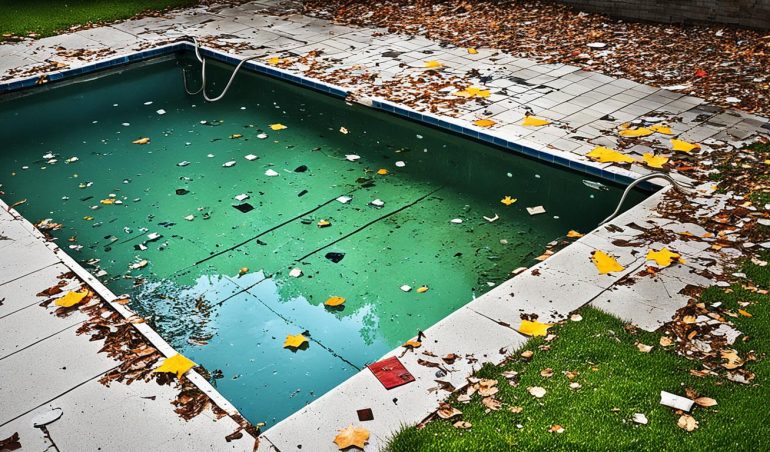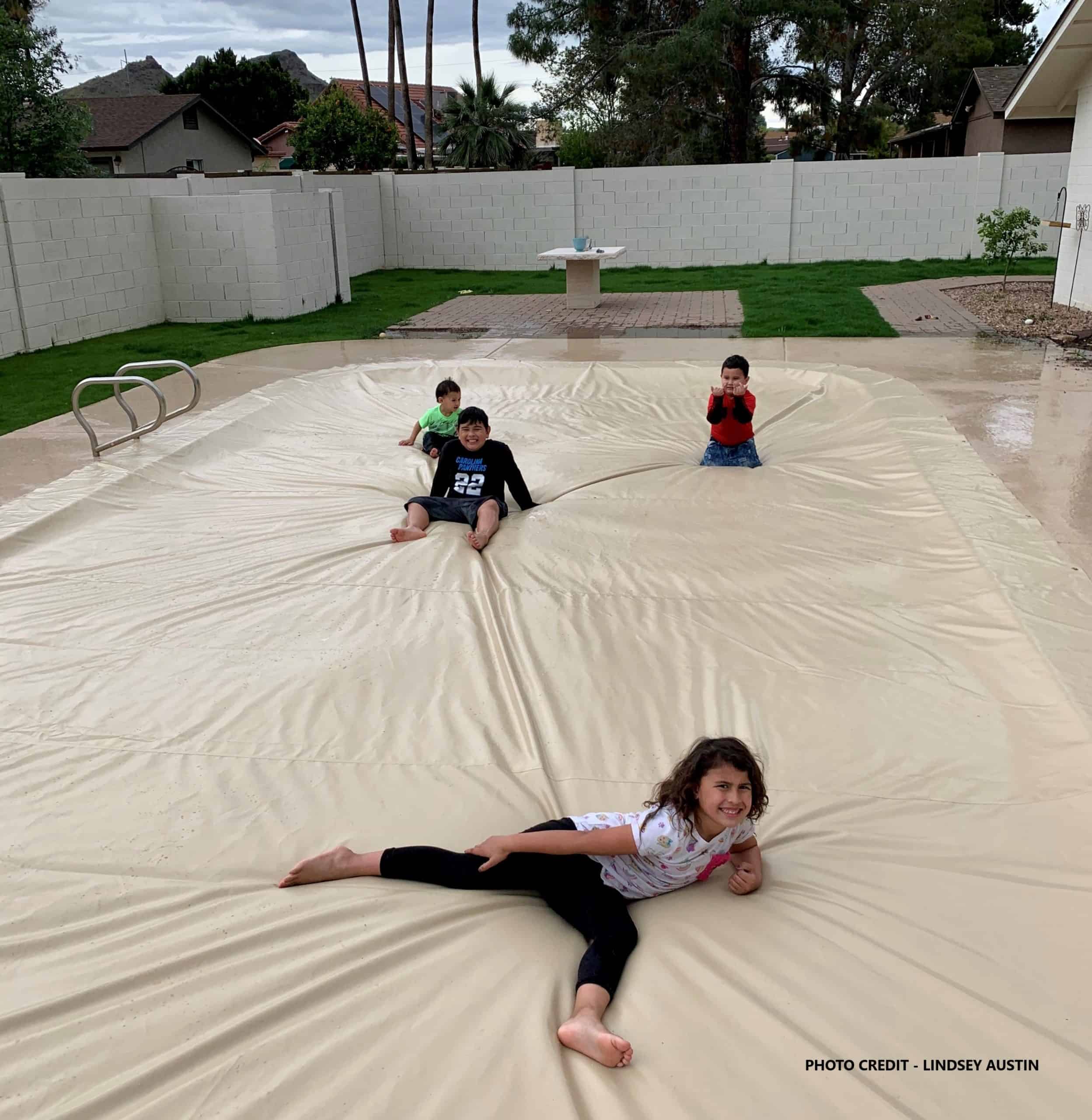Imagine the anticipation as the warm sun graces your face, the cool water beckoning you for a refreshing dip. For many of us, the pool is not just a place to swim; it’s a sanctuary, a retreat from the demands of everyday life. But what happens when we neglect to protect our beloved oasis during the off-season?
An uncovered pool can quickly transform from a sanctuary into a battleground, as it becomes vulnerable to a host of risks and consequences that can wreak havoc on its maintenance, clarity, and overall health. Without a cover, your pool is exposed to the elements and the perils that lurk just beyond its edges.
Today, we’ll explore the impact of leaving your pool uncovered during the off-season, delving into the consequences that await those who don’t prioritize pool maintenance and health. From debris buildup to algae growth, we’ll uncover the hidden dangers that can turn your private paradise into a murky nightmare.
Key Takeaways:
- An uncovered pool is susceptible to debris buildup and can become a time-consuming maintenance nightmare.
- Exposure to sunlight in an uncovered pool can lead to algae growth, turning your crystal-clear water into a green, cloudy mess.
- Leaving your pool uncovered can result in water evaporation, chemical imbalance, and potential structural damage.
- An uncovered pool requires more frequent cleaning and higher chemical usage to maintain water balance and prevent issues.
- Neglecting to cover your pool can lead to increased maintenance costs and compromised water quality.
The Impact of Leaving Pools Uncovered During the Off-Season
Leaving your pool uncovered during the off-season can have unintended consequences on its maintenance and overall health. Two major issues that arise from not covering your pool are debris buildup and algae growth.
Debris buildup: Not covering your pool increases the likelihood of debris buildup. Leaves, twigs, branches, and other outdoor debris can easily find their way into the pool and accumulate over time. As a result, pool maintenance becomes more challenging and time-consuming. Manual removal of debris and more frequent cleaning are necessary to maintain a clean and inviting pool environment.
Sunlight exposure and algae growth: Sunlight plays a significant role in triggering algae growth, and an uncovered pool allows ample sunlight exposure. Algae thrive in warm and sunny environments, and the absence of a cover enables sunlight to penetrate the water freely. This creates an ideal environment for algae to grow and multiply, leading to green, cloudy, and unhealthy pool water that requires extensive cleaning and treatment to restore its clarity.
To prevent debris buildup and algae growth, it is crucial to cover your pool properly during the off-season. An appropriate pool cover acts as a barrier against outdoor elements, reducing the need for frequent cleaning and preventing the growth of unwanted algae.
Risks Associated with Skipping the Pool Cover
Leaving your pool uncovered during the off-season can have several risks and consequences that can impact the overall maintenance and health of your pool.
- Water Evaporation: An uncovered pool experiences higher rates of water evaporation. This can lead to a drop in water levels, causing a multitude of issues.
- Chemical Imbalance: Without a cover, the chemicals in the pool, such as chlorine, can dissipate more quickly due to sunlight exposure. This can result in an imbalance that requires additional chemicals to restore the water’s balance and effectiveness.
- Structural Damage: Exposing your pool to the harsh winter elements without a cover can lead to structural damage. Freezing temperatures can cause water in the pool to expand, putting pressure on the pool walls and potentially leading to cracks or other forms of damage. This can result in costly repairs or replacements for the pool and its equipment.
By understanding the risks associated with leaving your pool uncovered, you can make informed decisions to protect and maintain your pool effectively.
Consequences for Pool Maintenance and Clarity
Leaving your pool uncovered during the off-season can have significant consequences for pool maintenance and water clarity. An uncovered pool requires more frequent cleaning and maintenance compared to a covered pool.
Without a cover to protect it, your pool becomes more susceptible to dirt, debris, and other contaminants. This means you’ll need to spend more time vacuuming, skimming, and scrubbing the pool to keep it clean and clear. Regular maintenance routines become essential in order to maintain a healthy and inviting pool.
In addition to increased cleaning requirements, you may also need to use higher levels of chemicals to maintain proper water balance and prevent issues like algae growth. An uncovered pool is exposed to external factors that can impact water quality, such as sunlight, rain, and wind. These factors can introduce bacteria or algae into the pool, requiring the use of additional chemicals to maintain sanitizer levels and prevent the growth of harmful microorganisms.
To keep your pool in optimal condition, it is important to regularly test the water and adjust the chemical levels as needed. This will help ensure that the water remains safe, clear, and free from any potential hazards. By staying on top of the maintenance and cleaning requirements, you can enjoy a sparkling pool all year round.
“What happens if you don’t cover your pool?”: Analyzing Pool Health
Not covering your pool can result in algae growth and water quality issues. Algae thrive in warm and sunny conditions, which an uncovered pool provides. This can lead to green, cloudy, or discolored water, affecting the overall appearance and health of your pool.
Neglecting to cover your pool can also lead to increased maintenance costs. Dealing with issues such as algae growth, water clarity, and equipment damage can result in additional expenses for cleaning products, water treatments, and repairs or replacements of pool equipment.
Alternatives to Traditional Pool Covers
If you prefer not to use a traditional pool cover, there are alternative options available to maintain the health and cleanliness of your pool. These alternatives can provide effective protection while offering added benefits.
Leaf Net
One popular alternative is the use of a leaf net. This net is designed to keep larger debris, such as leaves and twigs, out of the pool. It is placed over the water’s surface and acts as a barrier to prevent debris from entering the pool. The leaf net can be easily removed and cleaned when necessary, saving you time and effort in pool maintenance.
Pool Screen Enclosures
Another alternative is a pool screen enclosure. These enclosures are made of durable mesh material that surrounds your pool area, providing both protection and insect control. The screen keeps out leaves, insects, and other debris, while still allowing airflow and natural light into the pool area. Pool screen enclosures offer a more open feel compared to traditional covers while effectively keeping the pool clean.
Retractable Enclosures
If you prefer versatility and convenience, retractable enclosures are a great option. These enclosures can be opened or closed at your convenience, allowing you to enjoy an open-air pool or shield it from debris and the elements when needed. Retractable enclosures can be manually operated or motorized for added ease of use. They provide flexibility in maintaining your pool while also considering your preferred level of exposure.
Solar Pool Covers
For those looking to harness the sun’s energy while still providing some protection, solar pool covers are an excellent choice. These covers are designed to heat the pool water using solar energy, helping to maintain a comfortable swimming temperature. In addition to their energy-saving properties, solar pool covers also act as a barrier against debris and reduce evaporation, which can minimize water loss. They are a practical and eco-friendly alternative to traditional covers.
Call Solar Safe Pool Covers for our Phoenix area at (623) 471-4832 for professional solar safe pool covers and installation.
These alternative pool cover options provide practical and effective solutions for pool maintenance and health. Whether you prefer the convenience of retractable enclosures, the simplicity of leaf nets, the protection of pool screen enclosures, or the energy-saving benefits of solar pool covers, there is an alternative option available to suit your needs and preferences.
Winterizing Strategies for Uncovered Pools
When winterizing an uncovered pool, it’s important to take steps to protect it from freezing temperatures and potential damage. While not having a pool cover can make winterizing more challenging, there are strategies you can implement to mitigate the risks.
Firstly, it’s crucial to remove as much water as possible from the pool to prevent freezing. This can be done by draining the pool below the skimmer level, ensuring that all water lines are also emptied. By reducing the amount of water in the pool, you can minimize the risk of ice formation and subsequent damage to the pool structure.
Additionally, utilizing proper winterizing equipment can help protect your uncovered pool during freezing temperatures. Consider using pool plugs to seal off the pool’s return lines and skimmers, preventing water from entering these areas. Winterizing chemicals can also be used to treat the remaining pool water, inhibiting the growth of algae and preventing staining or discoloration.
Another valuable tool for winterizing uncovered pools is air pillows. These inflatable devices are placed in the center of the pool and help support the weight of accumulated ice and snow. Air pillows minimize stress on the pool’s walls and provide additional protection against potential damage caused by freezing temperatures.
By implementing these winterizing strategies for your uncovered pool, you can minimize the risks associated with leaving your pool exposed during the off-season. While a pool cover is the most effective means of protection, these alternative strategies can help maintain the integrity of your pool and reduce the potential for costly repairs.
Early Pool Opening Recommendations
After leaving your pool uncovered during the off-season, it’s important to follow certain steps to ensure a smooth pool opening. Opening your pool involves cleaning, water balance testing, inspection, and equipment maintenance.
Firstly, it’s crucial to thoroughly clean your pool to remove any debris or algae that may have accumulated. This can be done by using a pool skimmer or vacuum to remove leaves, dirt, and other particles from the water and pool surfaces. Pay close attention to the pool walls and floor to ensure they are free of any buildup.
Once the cleaning process is complete, it’s time to test and balance the water chemistry. Use a pool water test kit to check the levels of pH, chlorine, alkalinity, and calcium hardness. Adjust these levels as needed to ensure the water is safe and ready for use. Proper water balance not only improves the clarity of the water but also helps maintain the effectiveness of pool chemicals.
Before opening your pool, it’s essential to inspect and maintain the pool equipment. Check for any damage, leaks, or issues with filters, pumps, and other components. Ensure that all equipment is functioning correctly and efficiently. Perform any necessary repairs or replacements to avoid any disruptions to the pool’s operation.
Following these early pool opening recommendations will help you prepare your pool for the swimming season. By starting with a clean pool, balanced water chemistry, and well-maintained equipment, you can enjoy a hassle-free and refreshing swimming experience.
Conclusion
Leaving your pool uncovered during the off-season can have significant consequences for its maintenance, clarity, and overall health. An uncovered pool is more prone to debris buildup, requiring frequent cleaning and maintenance to keep it clear. The exposure to sunlight can lead to algae growth, resulting in green, cloudy water that requires extensive treatment.
Not covering your pool also increases the risk of water evaporation and chemical imbalance. Without a cover, water levels can drop, leading to inadequate chemical treatment and potential health risks. Additionally, exposing your pool to freezing temperatures without protection can cause structural damage and costly repairs.
To protect and maintain your pool effectively, consider alternatives to traditional pool covers such as leaf nets or pool screen enclosures. Proper winterizing strategies, such as draining the pool below the skimmer level and using winterizing equipment, are essential. When opening your pool, perform a thorough cleaning, balance the water chemistry, and inspect and maintain the pool equipment to ensure its proper functioning.






